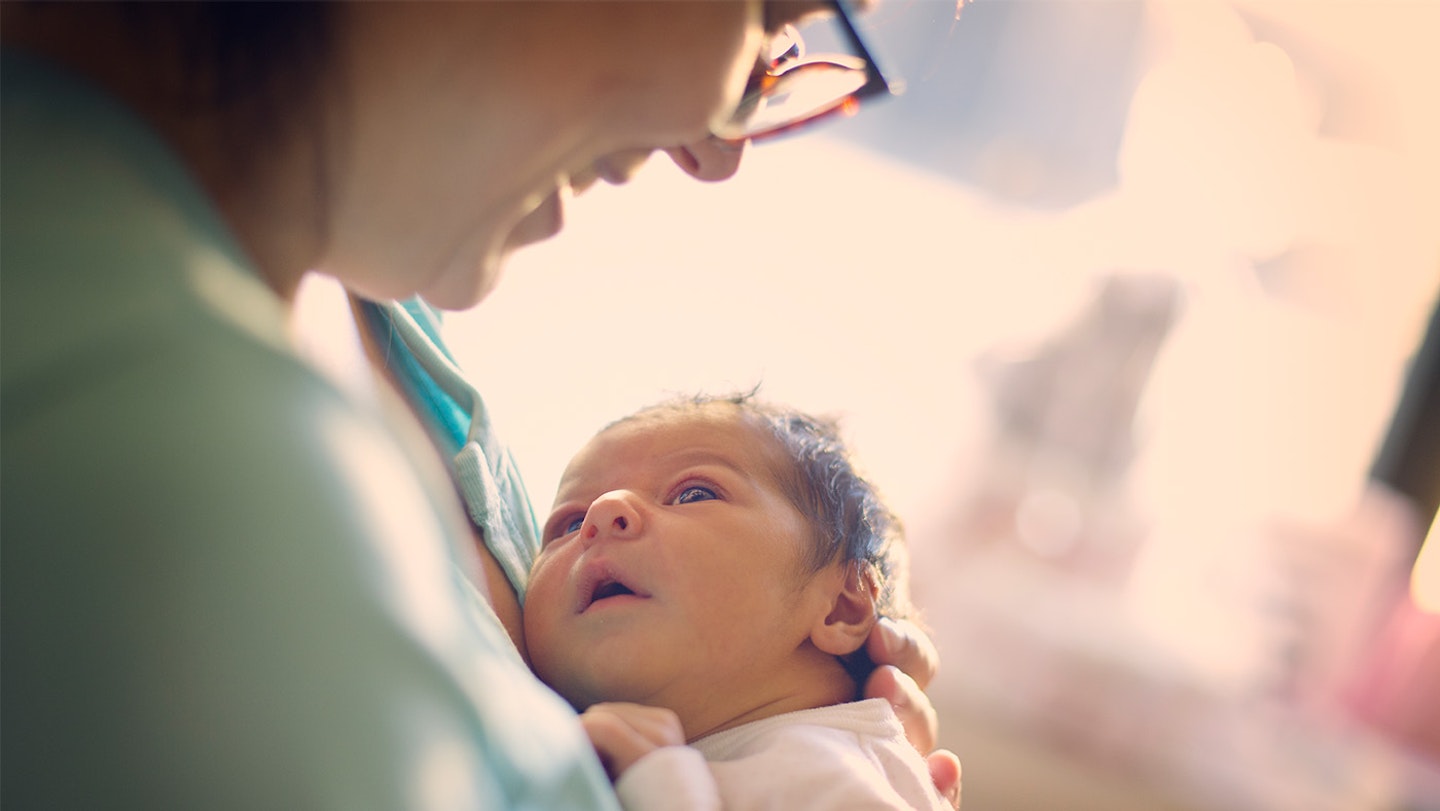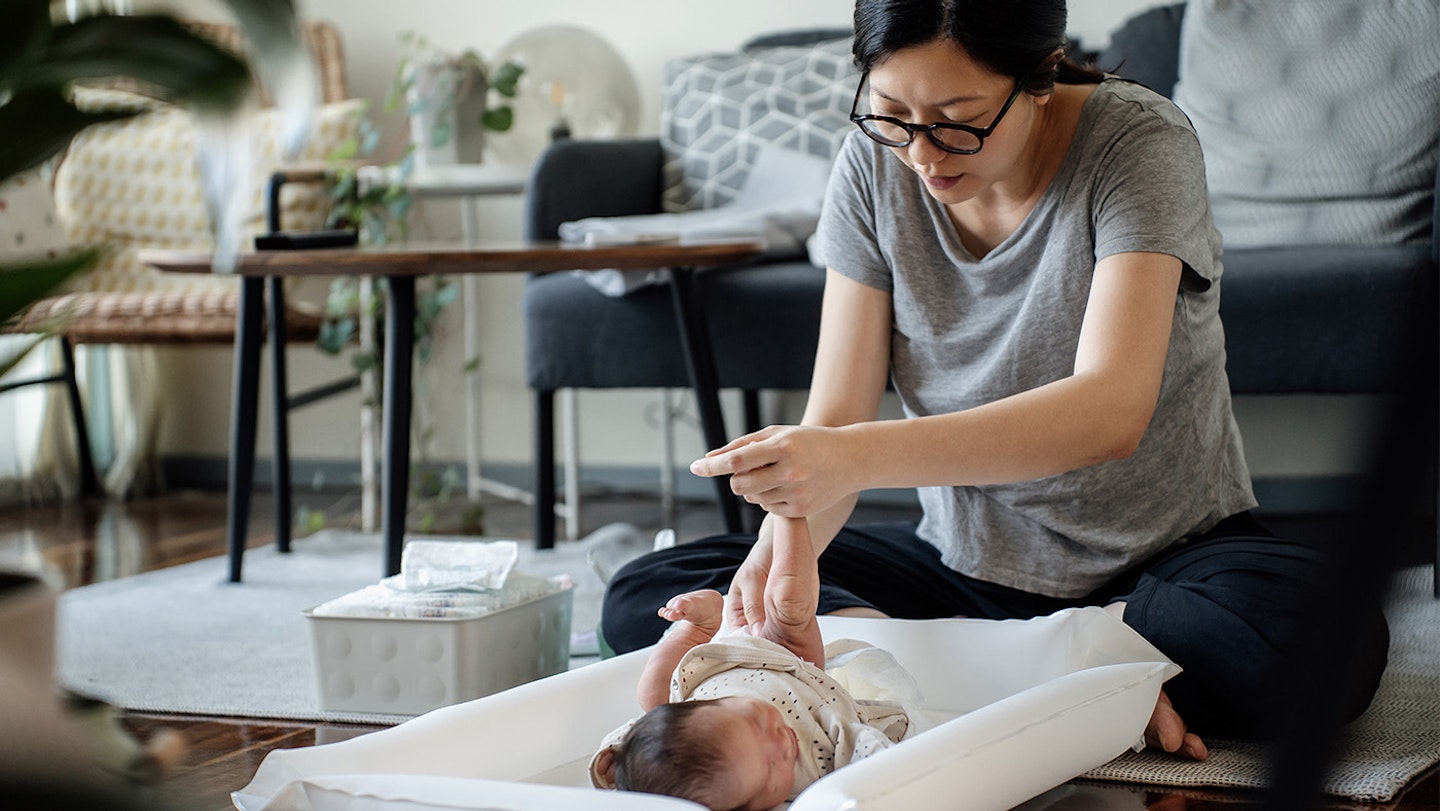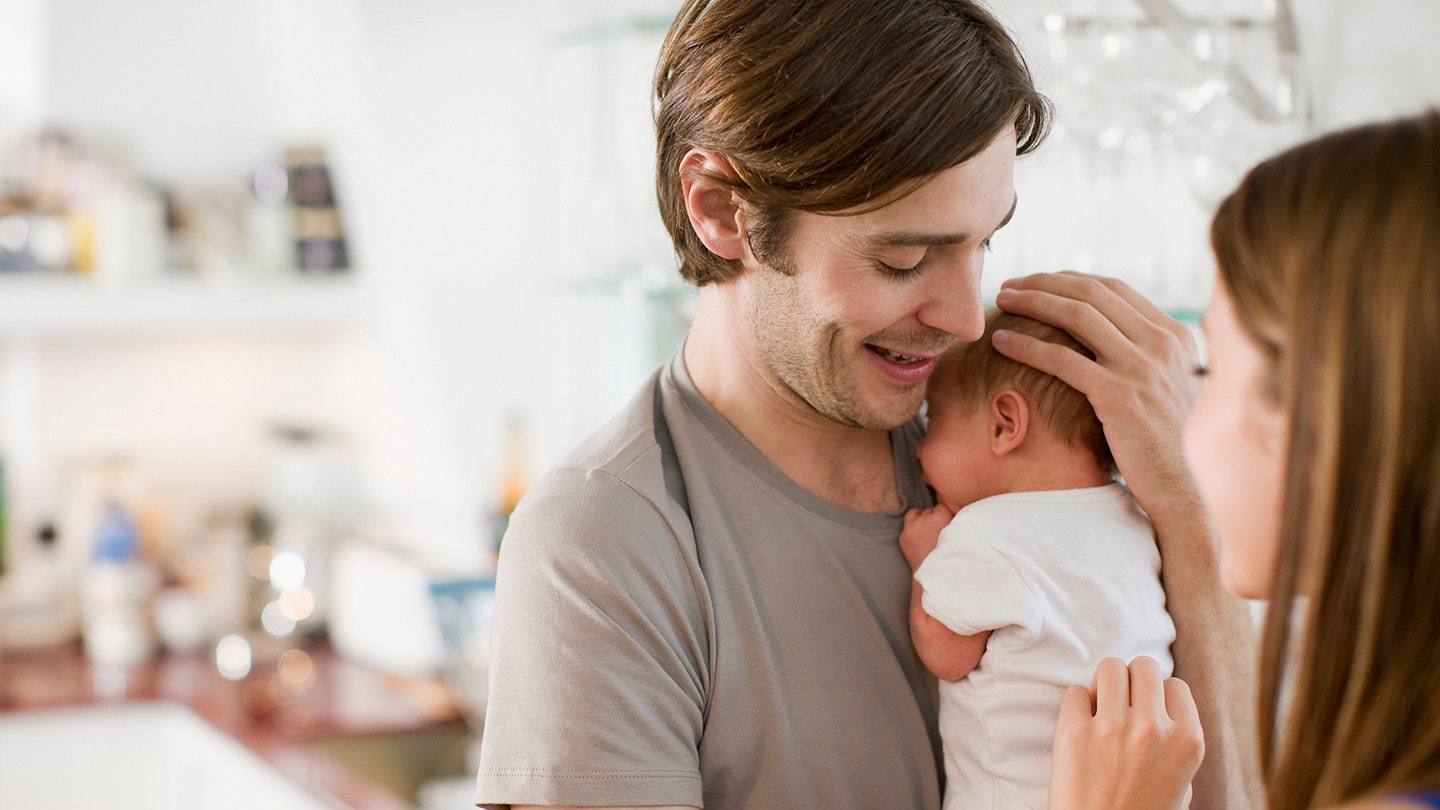It may feel as though you only gave birth yesterday, but your 3-week-old baby is likely to have changed a lot in those weeks. If you're in the UK, your partner may have just gone back to work, so this could be the first week that you're figuring out life as a new mum without a spare pair of hands. If so, don't worry. We're here to help, with advice from the experts on everything you need to know about your little 3-week-old baby.
You're probably starting to realise that your baby is growing and developing, fast. You may well have noticed changes since they were 2 weeks old, and in just a week they'll be 4 weeks old, and getting stronger and more aware by the day.
To help you discover the 3 week old baby milestones to look out for, and what to know about feeding and sleeping, we've spoken to the experts, Sleep Consultant Lucy Wolfe H. Dip RM, MA, and NCT Practitioner and Service Development Manager, Katherine Walker.
From physical growth to cognitive development, sleep to feeding, here’s what to expect with your 3 week old baby and how to help them in their development.
Development milestones for a 3 week old baby
At three weeks old, your baby is still brand new to the world, and while their movements and responses might seem subtle, there's a lot going on behind those sleepy eyes. At this stage, most babies are still settling into life outside the womb. They’ll likely be sleeping a lot, waking to feed, cuddle, or have a little wriggle on the changing mat.
Growth
According to Charlie Blyth, founder of The Healthy Child Co. and a dedicated specialist public health nurse (health visitor), your little one may have just gone through a growth spurt or be about to go through one. They may have lost weight after birth and should be back to their birth weight now but don't be tempted to compare their growth to other babies of a similar age. Your health visitor or doctor will be keeping an eye on your baby's weight and height gain and recording their growth on the centile charts in their personal child health record (PCHR). Should there be any concerns, your health visitor will be able to assist.
Strength
You might notice your baby starting to lift their head briefly when lying on their tummy – these early efforts are part of building neck and shoulder strength, essential for future milestones like learning to roll over. To help develop these neck muscles, you should do some tummy time with baby - this could be on their play mat or while lying on your chest. It will also reduce the likelihood of your baby developing a flat head syndrome from always being on their back. Put your face in front of your baby's while they’re on their stomach, as this will encourage them to look up at you and start to lift their head and move it from side to side more.
Sleep patterns and routine for 3 week old baby
At this age, your baby is sleeping a lot, but you probably aren't. During the first few weeks of a baby’s life, they need around 12-17 hours a day of sleep, with frequent feeds in between. It sounds peaceful, but by now you know it’s anything but that. This is spread across a 24-hour period, and your baby will need to feed frequently as their tummy is so small. This means they'll be waking to feed in the night, so while they're getting plenty of sleep, you're probably pining for an unbroken night's kip.
Don’t worry if everyone in your mummy group seems to be getting more sleep than you are, you are doing a great job - some babies are just better sleepers. If you're bottle or combination feeding, try to share the night feeds with your partner. If you're exclusively breastfeeding, see if they can help settle little one after a feed while you go back to sleep.
As Lucy says, "I encourage you not to worry about the amount of sleep and more focus on this early period of time of getting to know each other, understanding that it can feel very challenging and tiring. Do your best to share and support each other as you navigate early mothering."

Common Sleep Challenges at 10 Weeks
As Lucy explains, sleep challenges at this stage are normal and likely to just be typical infant sleep. You'll probably find you're not getting much sleep, but just remember that this is normal. Lucy notes that it's important not to put yourself under extra pressure. "There is lots of developmental sleep variability, as well as differing needs for feeding, sleeping and care per individual child, so the main message would be to not put yourself under any great strain to improve sleep."
As your baby has only just arrived, they may be finding the transition to the world overwhelming, which can mean they struggle to be put down to sleep. Lucy suggests having a toolkit of ways to soothe baby, which can include holding them, rocking, bouncing, using a sling, or a stroller, or "any means that helps to calm and regulate your small baby as they transition to being."
Top sleep tips for a 3 week old baby
Ask for help and accept offers of help: Lucy recommends saying yes to all and any offers of help and asking for help when you need it.
Learn their sleep cues: Try to learn their sleep cues such as brief eye rubs, rather than waiting for later cues that represent being over-tired which can make it harder to settle them.
Help your baby's developing circadian sleep system: Establish the difference between night and day by not altering your own activities during daylight hours. When it’s daytime, keep the house bright and noise levels normal, then at night time make sure not to play or fuss too much when they wake up and keep the house dark and peaceful. That way your baby will begin to recognise that nighttime is for sleeping.
Start thinking of a ritual: Lucy notes that by 6 weeks, you can introduce a pre-sleep ritual at bedtime specifically to begin to help them with the transition from awake to asleep.
Sensory & cognitive development for 3 week old baby
Sight
In terms of senses, your baby’s vision is still developing, but they can now focus on faces and objects around 20–30cm away – the perfect distance for gazing lovingly at you during a feed. Katherine Walker notes that "when a baby is born they can see in shades of grey, but by 3 weeks old baby's vision improves and they begin to see in colour."
Cognitive growth
You might also catch the beginnings of social interaction, like your baby staring at your face for longer or responding to your voice. While most babies show off their first smile between six weeks old and twelve weeks old, you might see them practicing for this occasion (though these may still be 'reflex smiles' or wind-related for now!). Every baby develops at their own pace, but by the third week, these little cues are signs that your baby is already learning, growing, and connecting with the world around them.
The best thing you can do to improve your baby’s cognitive development at this stage is to allow them to study your face and copy your lip movements. They will start to develop subtle cues you may notice if you watch carefully.
Hold your baby's face close to yours and speak to them. While they won't be able to understand everything just yet, the third week is a great time to start building their language development. They will make noises in response and this is a great way to bond with your baby.

Listening
Your baby may now be recognising songs or sounds they heard when they were in the womb, proving babies start learning before they enter the world. They will also start realising they can make specific things happen, but they will find it difficult to remember what they've learned. Don’t worry, their memory will improve as the weeks go on.
Feeding and nutrition for 3 week old baby
As Katherine explains, a 3-week-old baby needs around 8-12 feeds in every 24-hour period. These will not be fixed intervals and it is usually best to follow the baby's lead and watch for any hunger cues they may be exhibiting, such as moving their head and neck or trying to suck their fingers.
"Because every baby is different, there is not a set number of ml's that a bottle-fed baby should drink. Ensuring that they are offered milk 8-12 times a day, gain weight and produce 6 wet and 2 dirty (with poo) nappies in every 24hr period, generally shows that your baby is getting enough milk, whether they are feeding directly from the breast or from a bottle."
The best thing you can do is feed them whenever they need it - babies typically know exactly how much food they need at this stage - but take it slowly. Katherine notes that, "when feeding a baby with a bottle, it is important that the milk flow is slow to prevent them from taking too much milk. Your baby may not finish a bottle and may show signs when they have had enough."
If you’re breastfeeding, it may be more difficult to know how much breast milk your baby is having, but as long as they are latching on and feeding until they want to stop, all is ok.
Your baby's health and safety: tips for 3 week old baby
Colic: Katherine tells us, "newborn babies can begin to cry more by 3 weeks. A small number of babies may go on to develop colic symptoms, which include crying more than 3 hours a day for 3 days a week but are otherwise healthy and gaining weight."
Affecting up to 40 per cent of little ones, colic in babies is a normal fear for many parents. There is no definite cause of colic but it often occurs during the three to six-week mark in your baby’s life. However, it generally improves by three months old – which probably still feels like a long way off right now. The best thing you can do is figure out whether your baby is experiencing colic, or if there is another reason, such as a urinary infection, in which case you should contact your baby's doctor. Katherine suggests seeking support from your health visitor who may be able to suggest some coping strategies.
Vaccinations: If you're following the NHS vaccination schedule you have another five weeks before your baby needs any vaccinations at eight weeks old. This will include the 6-in-1 vaccine, Rotavirus vaccine and MenB.
Skin: Week three is often the time when your baby will develop certain skin conditions like rashes, acne or cradle cap. These are normal but can be discomforting for your little one. Try to use sensitive soap, reduce the number of baths your baby is having, and don't squeeze any spots.
Baby sick: As you cuddle your baby against your shoulder, they’ll bring up regurgitated dribbles. ‘A newborn has a very small stomach that can’t handle much milk," says Ellie. "And the muscle that keeps the milk in their stomach isn’t very strong." Your handy muslin is there to save the day.
Poo: When it comes to poo, every baby is different. Some may poo straight after a meal or others may be less regular. As long as your baby is pooing between one and ten times a day, they’re within the norm. If you’re worried about the poo itself, check out our poo colour chart.

Practical parenting tips
Are you going it alone? If your partner has returned to work, you may be starting to feel lonely in your everyday activities. When you're ready to have some social contact, getting outdoors with your baby can help you both. One way of doing so is by joining a local NCT Walk and Talk Group, which offers the chance to share experiences with other parents while getting some fresh air. Now could also be a good time to join some parenting groups, meet friends on parenting apps, and maybe start looking for classes like baby massage.
Looking after yourself whilst looking after a new baby can be a challenge, so getting help from friends, family or wider networks can be helpful. NCT’s Parents in Mind project, for example, provides safe, sensitive, and impactful perinatal mental health peer support, delivered by local parent volunteers. It allows new parents to connect with others who have a similar experience.
Postnatal depression: Your hormones should be settling now, and that should mean bye-bye baby blues. If you’re still struggling with intrusive thoughts, feelings of failure or as though everything could go wrong, you may be experiencing postnatal depression or postnatal anxiety. If you do find yourself struggling, remember this doesn't make you a bad mother and is a condition that affects one in ten women. Take a trip to your doctor for advice and don't be afraid to get help when you need it.
Pelvic floor: Your pelvic floor has been working hard for nine months so it's important to keep doing your pelvic floor exercises to help it get back into shape, and aid bladder control. "Imagine you need to hold in a wee and a poo - and squeeze!" says Dr Ellie Cannon. "Repeat this for five minutes every time you feed your baby. As you become stronger, try holding in your tummy muscles at the same time."
Sore breasts: Breasts that are working hard to feed a baby can get painful, especially if you're experiencing the likes of mastitis. Keep a couple of clean nappies in the freezer. After a feed, place them in your bra to cool and soothe.
Conclusion
After only a few weeks, both you and your 3-week old baby are probably still adapting to life. They'll be going through a growth spurt, or have just finished one, and will spend a lot of their time sleeping. When they're not sleeping, they'll be feeding, but it's a good idea to try and fit in a few minutes of tummy time, or interaction such as looking at them and talking to them. Baby can see about 20-30cm in front of them, so they may start to interact more and focus on your face if you're close enough.
Your body has been through a lot of changes so now is also the time to try and look after yourself. if you need help, whether that's help with the night feeds or to talk to someone about your mental health, don't be afraid to ask.
3-week-old baby FAQs
What should my 3 week old baby be doing?
The first thing to remember is that babies all develop at their own pace, so while there are milestones your baby might have reached, try not to worry if they're not growing or developing at the same time as their friends. At 3 weeks, your baby may start trying to lift their head for a few seconds during tummy time. Their movements may start to become smoother, and their sight is developing so they can see around 8" in front of them.
What is a 3 week old baby's routine?
A 3 week old baby's routine will revolve mainly around sleeping and feeding. They won't be in a predictable routine yet, so will probably wake to feed and maybe have a little tummy time, and then they'll be back to sleep.
How long can a 3 week old go between feedings?
A 3 week old baby will generally go for 2-3 hours between feeds, though all babies are different and a breastfed baby may feed more regularly than a bottle-fed baby. Pay attention to their hunger cues such as rooting, sucking on their fingers, fussiness and crying.
About the experts
Lucy Wolfe, HDip, MA, is a Leading Irish Sleep Consultant, Relationship Mentor, Author of the best-selling books: The Baby Sleep Solution and All About the Baby Sleep Solution and Mum of four children. She has completed extensive training and education in Ireland, UK, and USA, together with continuous professional development, staying informed and engaged with recent research and development in the field of psychoanalytic and psychodynamic theories, conscious parenting, childhood development and sleep. She has been in practice, actively working with parents for over thirteen years.
Katherine Walker has a BA (Hons) Birth and Beyond Educator and a Post Graduate certificate in Learning and Teaching in Higher Education, making her a Fellow of the Higher Education Academy. She has extensive experience as an NCT Practitioner since 2009, working directly with parents as well as training NCT Practitioners. Katherine is now Service Development Manager at NCT, where she oversees parent insight and evaluation and uses these insights to improve services for all parents.
Charlie Blyth is the founder of The Healthy Child Co and a dedicated specialist public health nurse (Health Visitor) with over 13 years of experience in the NHS, including 9 years as a health visitor, where she supported hundreds of families in the community. With a deep commitment to child health and development, Charlie is passionate about challenging outdated parenting methods and advocating for evidence-based practices to promote responsive parenting and positive child growth.
Dr Ellie Cannon is a dynamic, straight talking GP, mum of two, and author of Keep Calm: The New Mum’s Manual. She is well known for her health pages in the Mail on Sunday and her vibrant presence across TV, radio and social media. She has also authored books on mental health and parenting and is celebrated as a myth-buster and voice of sense within health and science.
About the author
Rebecca Lancaster is a Digital Writer for Mother&Baby, drawing on ten years of parenting her two children to help others navigating their own parenting journey. As a freelance writer, she spent ten years working with leading lifestyle brands, from travel companies to food and drink start-ups, and writing everything from hotel reviews to guides to the best British cheeses. She’s particularly interested in travel and introducing her children to the excitement of visiting new places, trying different foods (less successfully) and experiencing different cultures.
